Resources (827 found)
Statement No. (3/2015) The Visit to Insein Central Prison
1. A team from the Myanmar National Human Rights Commission, comprising of Commission Members U Zaw Win, U Yu Lwin Aung, Dr Nyan Zaw and Dr Daw Than Nwe, accompanied by the staff of the Commission visited the Insein Central Prison in Yangon Region on the 17 and 18 of February 2015. The visit was made under Sections 43, 44 and 45 of the Myanmar National Human Rights Commission Law. The team divided into four groups and inspected the prison as follows […]
• • •Open Letter to Special Rapporteur from Korean Transnational Corporations Watch
Korean Transnational Corporations Watch (hereafter KTNC Watch) is a network of human rights/labor/environment/public law organizations in Korea which has long been active in responding human rights issues of Korean-owned or -invested companies overseas […]
• • •Amnesty International Annual Report – Myanmar Chapter
Despite ongoing political, legal and economic reforms, progress on human rights stalled, with some backward steps in key areas. The situation of the Rohingya deteriorated, with ongoing discrimination in law and practice exacerbated by a dire humanitarian situation. Anti-Muslim violence persisted, with the authorities failing to hold suspected perpetrators to account. Reports of abuses of international human rights and humanitarian law in areas of armed conflict persisted. Freedoms of expression and peaceful assembly remained severely restricted, with scores of human rights defenders, journalists and political activists arrested and imprisoned. Impunity persisted for past crimes […]
• • •Assistance Association for Political Prisoners (Burma) and Former Political Prisoners Society (FPPS) Documentation Project Interim Report: February 2015
To date, government efforts to assist former political prisoners (FPPs) to acclimatize and reintegrate into society have been largely nonexistent in Burma. The effects of this inaction have, and continue to be hugely detrimental for the FPPs, their families, and for transitional justice efforts in the country. This inaction has become even more pressing since the government of Burma began releasing hundreds of political prisoners1 in a wave of amnesties following the 2011 political reforms […]
• • •The Long Road to Recovery: Ethnic and Community-based Health Organizations Leading the Way to Better Health in Eastern Burma
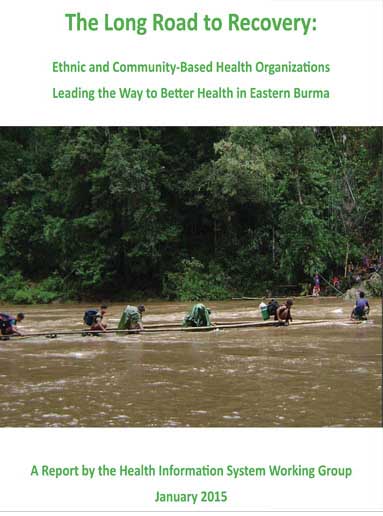 A new report, based on the first large-scale health survey in eastern Burma since recent ceasefires, shows some improved health indicators, linked to programming of local ethnic health providers, but highlights that sustained improvements to the overall health of conflict-affected communities remain dependent on the peace and reform process, and may take decades […]
A new report, based on the first large-scale health survey in eastern Burma since recent ceasefires, shows some improved health indicators, linked to programming of local ethnic health providers, but highlights that sustained improvements to the overall health of conflict-affected communities remain dependent on the peace and reform process, and may take decades […]
Amnesty International’s Written Statement on Myanmar to the UN Human Rights Council, Ahead of the 28th Session of the Council from 2-27 March 2015: Human Rights Under Threat
Myanmar’s backsliding on human rights reforms – only a few months before the general elections – underscores the necessity of the UN Human Tights Council to adopt a strong resolution on the situation of human rights in the country and to extend their mandate of the Special Rapporteur on the situation of human rights in Myanmar, according to Amnesty International on February 18 […]
• • •Linking Women and Land in Myanmar: Recognising Gender in the National Land Use Policy
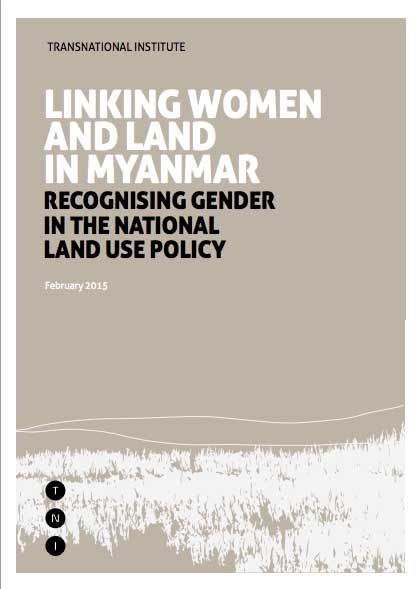 The draft National Land Use Policy (NLUP) that was unveiled for public comment in October 2014 intends to create a clear national framework for managing land in Myanmar1. This is a very important step for Myanmar, given the fundamental importance of land policy for any society – particularly those with recent and complex histories of political and armed conflict and protracted displaced populations. With 70% of Myanmar’s population living and working in rural areas, agriculture is a fundamental part of the country’s social and economic fabric. The majority of these are small-holder farmers, whose land rights are currently under threat. The situation is particularly dire for the country’s ethnic minority groups, who make up an estimated 30% of the population […]
The draft National Land Use Policy (NLUP) that was unveiled for public comment in October 2014 intends to create a clear national framework for managing land in Myanmar1. This is a very important step for Myanmar, given the fundamental importance of land policy for any society – particularly those with recent and complex histories of political and armed conflict and protracted displaced populations. With 70% of Myanmar’s population living and working in rural areas, agriculture is a fundamental part of the country’s social and economic fabric. The majority of these are small-holder farmers, whose land rights are currently under threat. The situation is particularly dire for the country’s ethnic minority groups, who make up an estimated 30% of the population […]
Yearning to be Heard: Mon Farmers’ Continued Struggle for Acknowledgement and Protection of their Rights
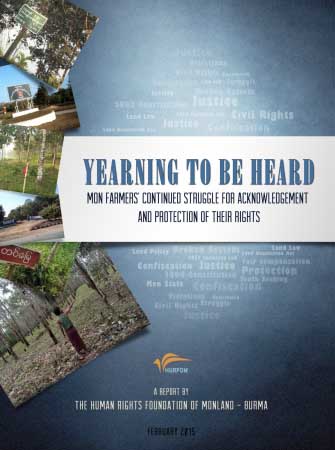 Land conflict is the most pressing issue facing Burma today, second only to armed conflict. Though Burma’s emerging democratic government has introduced land policy reform and has established land investigation commissions aimed to resolve land conflicts, civilian land acquisition by the Burmese military continues to take place, particularly in Burma’ minority ethnic areas.
Land conflict is the most pressing issue facing Burma today, second only to armed conflict. Though Burma’s emerging democratic government has introduced land policy reform and has established land investigation commissions aimed to resolve land conflicts, civilian land acquisition by the Burmese military continues to take place, particularly in Burma’ minority ethnic areas.
Transnational Institute: Towards a Healthier Legal Environment – A Review of Myanmar’s Drug Laws
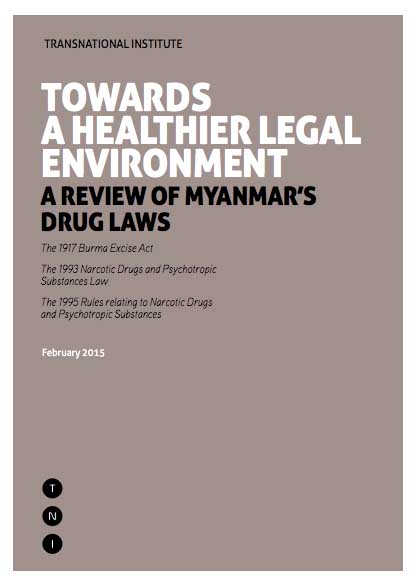 This report reviews Myanmar’s drug laws and related policies, including the 1917 Burma Excise Act; the 1993 Narcotic Drugs and Psychotropic Substances Law; and the 1995 Rules relating to Narcotic Drugs and Psychotropic Substances. Since these laws were enacted several important changes have taken place inside and outside of Myanmar […]
This report reviews Myanmar’s drug laws and related policies, including the 1917 Burma Excise Act; the 1993 Narcotic Drugs and Psychotropic Substances Law; and the 1995 Rules relating to Narcotic Drugs and Psychotropic Substances. Since these laws were enacted several important changes have taken place inside and outside of Myanmar […]
The Challenge of Democratic and Inclusive Land Policymaking in Myanmar: A Response to the Draft National Land Use Policy
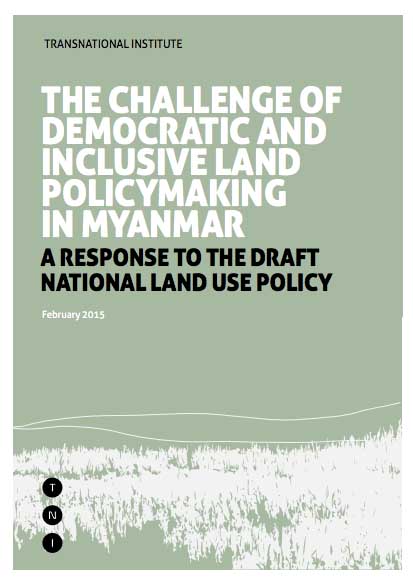 In October 2014 the Myanmar government unveiled a draft National Land Use Policy (NLUP) and announced it would take public comments for a limited time before finalizing the document. Once it is finalized, the new policy will determine the distribution, use and management of the country’s land and related natural resources like forests and rivers, for years to come […]
In October 2014 the Myanmar government unveiled a draft National Land Use Policy (NLUP) and announced it would take public comments for a limited time before finalizing the document. Once it is finalized, the new policy will determine the distribution, use and management of the country’s land and related natural resources like forests and rivers, for years to come […]









 All posts
All posts